Merritt Family History & Genealogy
Merritt Last Name History & Origin
AddHistory
We don't have any information on the history of the Merritt name. Have information to share?
Name Origin
We don't have any information on the origins of the Merritt name. Have information to share?
Spellings & Pronunciations
We don't have any alternate spellings or pronunciation information on the Merritt name. Have information to share?
Nationality & Ethnicity
We don't have any information on the nationality / ethnicity of the Merritt name. Have information to share?
Famous People named Merritt
Are there famous people from the Merritt family? Share their story.
Early Merritts
These are the earliest records we have of the Merritt family.

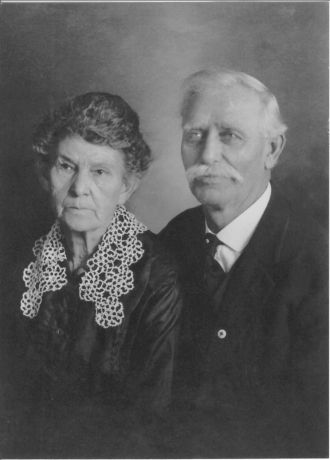


Merritt Family Members
Merritt Family Photos
Discover Merritt family photos shared by the community. These photos contain people and places related to the Merritt last name.

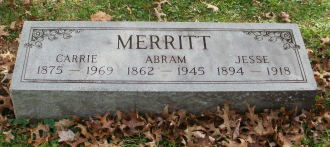

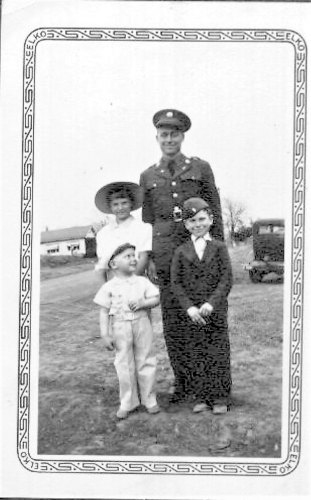

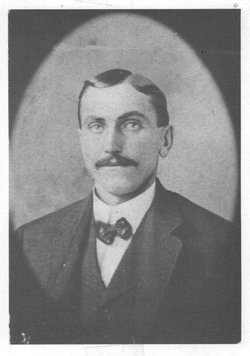
Back in the year 1880 my Grandfather Fredrick Deloss Merritt (Lotties Brother) would have been 16 years old. That would be close to the age he chose to leave home and go out to live with the Indians (he may have been younger), which his parents allowed him to do. It is unknown just how many years he lived with the Indians in Oklahoma but I know it was for a few. When my father was killed Dec. 1940 Ontario, California my older sister, brother and I were sent back to Oklahoma to live with our grandparents. I was to young to remember much of what I saw while playing in the basement, but my sister tells me it was filled with Indian Artifacts from the days Grandpa lived with the Indians. Sis said there was fancy Indian Ceremonial clothes, Moccasions, Weapons and Back Packs. I want to highlight "Back Packs" here because she said there were several that were for carrying a baby and was pretty fancy. The reason I want to bring that out is because of my Aunt Jo, Grandpas oldest Daughter. I understand she use to recieve a Government Check for some reason and none of the other kids got one. That always raised question as to why with her brothers and sister (my Mom). I feel that Grandpa was still closely connected to the Indians even after he went back to live in the White Mans world. After Grandpa died all of his Indian belongs disappeared. My Sister was born on the Pawnee Indian Reservation in Oklahoma about 1930 in a house where Grandpa once lived.

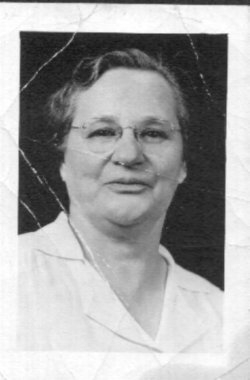
This followlng information came from a book written about Oklahoma history and its early families. Ths story was donated by my Grandmothers Brother Howard Quimby and was written in his exact words. The section I am going to add here is iust a small part of the Quimby Family history trom the book. My Grandmother' was the girl Ella mentioned in the story.
My family and my wife's family had much in common- Like all the families around Ingalls (Oklahoma), we know the Doolins. We just thought of them as we would any neighbors. They ate dinner with us several times. I was very small. but I remember them telling me that my sister Ella (Grandma), just a kid, used to ride on the horse with the Doolins. Of course the tolks knew they were outlaws, but they were not afraid, so she was allowed to go horse back riding wilh them on occasion. They always wore guns though, but in some ways they were as good as anyone. Frank and Jesse James, and the Dalton gang came to our house once. I never heard of them hurting a neighbor. The Dalton's would take a farmer's saddle horse, if their own horse was stove up. The'd just take the saddle off and give their tired horse which was a good horse, just worn out. Once Frank and Jesse James ate dinner when they were riding through, The folks didnt know who they were until they got through and then they told the folks, lt was simply customary to invite a neighbor or stranger to eat at meal time.

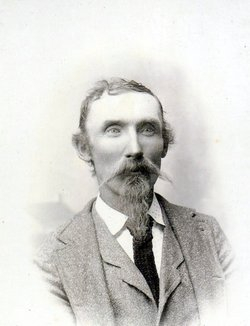
Michael Merritt 1842 - 1908 Michael Merritt Obit from The Frontier, 6 February 1908 Nebraska.
"Michael Merritt, a nomadic trapper, died at the residence of J. B. Long, in Willowdale township, last Saturday night after an illness of about a week, of brain fever and pneumonia. Deceased was about 63 years of age and had followed the life of a trapper, along the streams of this and adjoining counties, the past 5 or 6 years. He had been trapping along the Blackbird and getting sick started to go to Walnut, Knox County, where he has a brother living. When he reached Mr. Long’s he was delirious. He was taken in and medical aid summoned but pneumonia had set in and he sank rapidly, dying Saturday. His brother was summoned and came over from Walnut, staying with him one day, leaving the day before he died, and the poor old trapper was left to die among strangers, without the consoling touch or the sympathetic word of a relative. The remains were interred in the Mineola Cemetery, Monday."
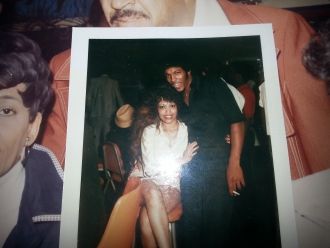
People in photo include: Renee Merritt
Merritt Family Tree
Discover the most common names, oldest records and life expectancy of people with the last name Merritt.
Updated Merritt Biographies

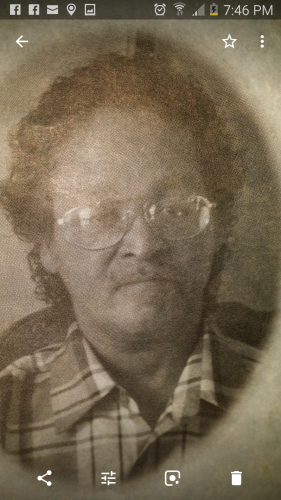

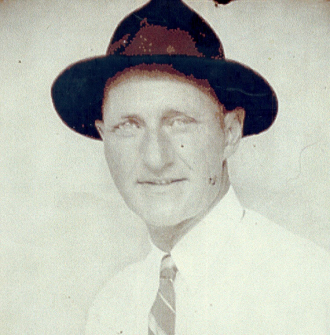

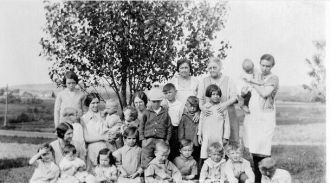
Popular Merritt Biographies

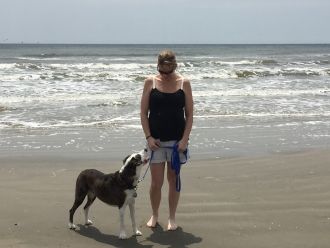









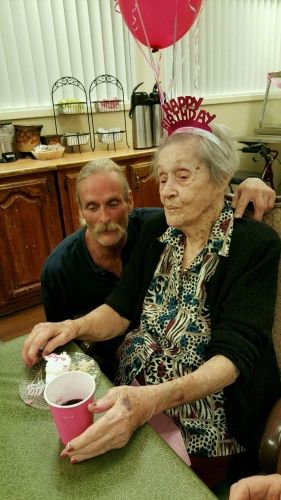
Merritt Death Records & Life Expectancy
The average age of a Merritt family member is 72.0 years old according to our database of 16,991 people with the last name Merritt that have a birth and death date listed.
Life Expectancy
Oldest Merritts
These are the longest-lived members of the Merritt family on AncientFaces.


Other Merritt Records
Share memories about your Merritt family
Leave comments and ask questions related to the Merritt family.
 Eugene Downes
Eugene Downes Followers & Sources


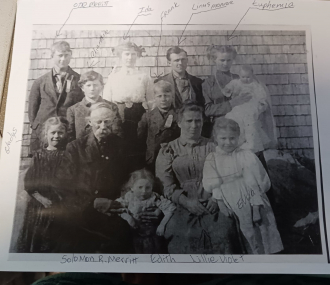

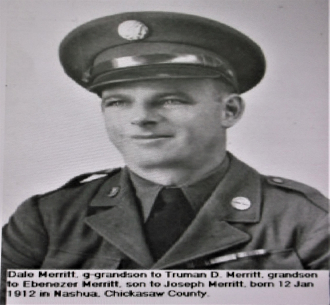
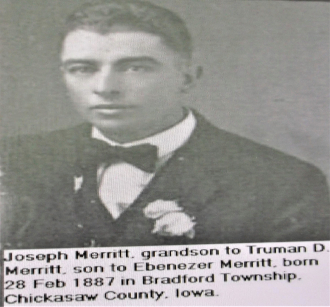
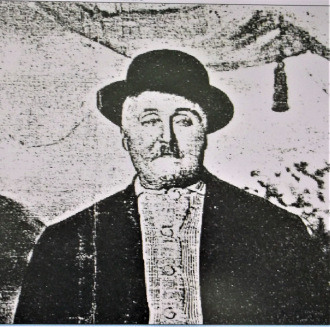
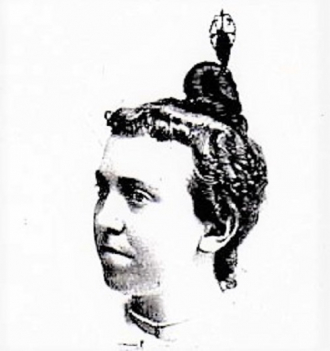
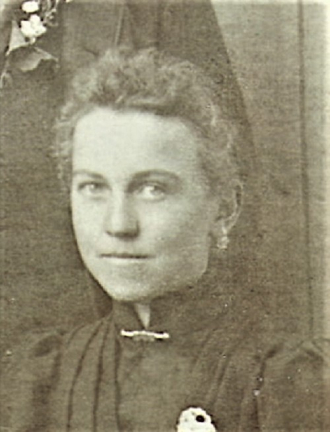
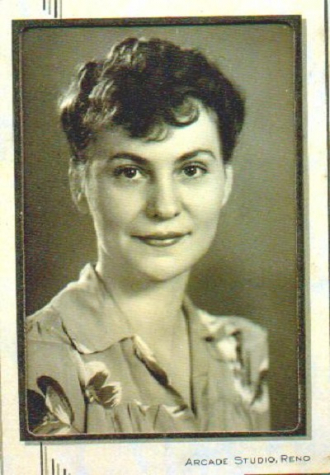
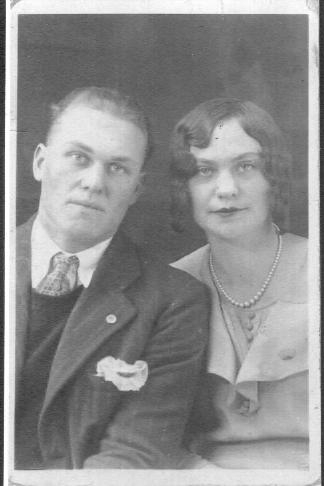

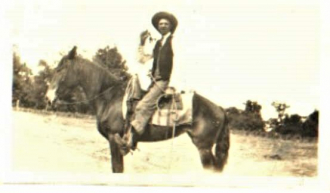

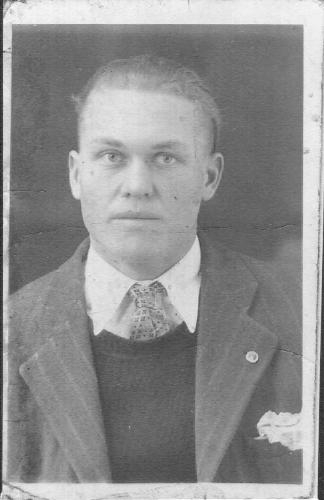

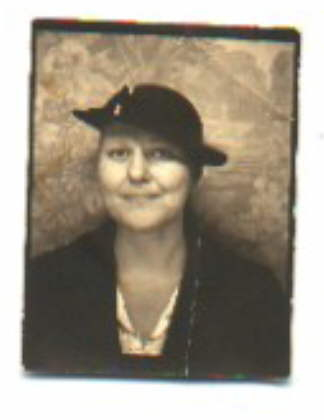

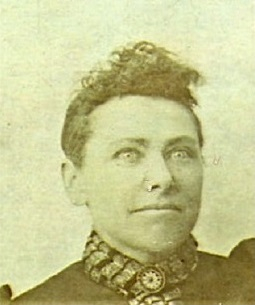

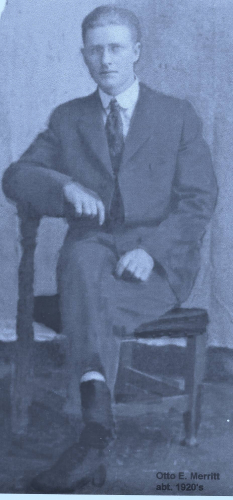



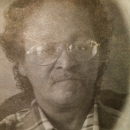
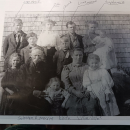
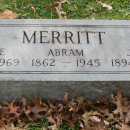
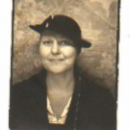

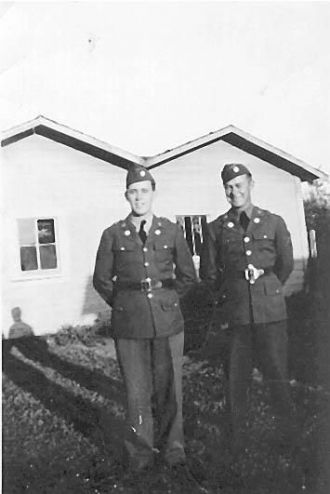
"Truman D. Merritt"
Merritt Family Folklore
Truman D. Merritt (1800-1875)
Truman D. Merritt was born in Rensselaer County, New York in the year 1800. In 1835 it is said that Truman was living in the township of Potter, Yates County, New York with his wife, one boy, one girl, 5 cows, 8 horses, 40 sheep and 15 pigs on 40 acres of land.
It is generally conceded that the distinction of being the first settler within the domain of Bradford Township, Chickasaw County, Iowa belongs to Truman D. Merritt, who moved there with his family in 1848, and settled on the east side of Little Cedar, near the place afterwards known as Greenwood. There he built a rude log cabin for a dwelling, the material for construction being cut from the abundant woods in that section. Two years later a daughter, Almira Merritt, was born to him, the first white child born in the county. The daughter grew to womanhood and married Avery Earl.
Relates Mr. Tucker - "I met him, with two yoke of oxen, he told me to follow his back track and I would be alright, that he cut the ice in the streams so I could get through, this was good news for me.."
Elizabeth A. Merritt
Truman Henry Merritt (1836-1922)
Truman Henry Merritt died in the State Soldiers Home Marshalltown on Monday Feb. 13, 1922, at age 86. 1 of 1st settlers old home place 2 miles east of Nashua, Iowa. When the Civil War broke out he answered his country's call and received a honorable discharge and returned to parents home, and after several years entered soldiers home.
Sworn Statement for Truman Henry's Military Pension
Dewitt C. Cram being duly sworn in oath, say that I reside here in Dubuque County, Iowa. That from Jan. 31, 1863 till some time in Nov or Dec 1864, I was Captain and in command of Co. B, 6th Regiment Iowa, and that during all that time Truman Merritt was a Private in that Company, always a dutiful and excellent soldier and never a shirker. That said Regiment and Company with it, during all that time when in the field and from early Spring, as some grass was up, till late in Oct or Nov of 1863 and 1864 was serving and marching under Gen. Sully in Dakota and Montana through uninhabited Deserts (except by Indians) for the most part, that it was Prairie mostly with out trees except along streams and with grass so thin and soil so dry and sandy and mixed with "Alkali" that marching in the burning sun, we were always in a cloud of dust which penetrated everywhere and everything. That from all this it resulted that the eyes of many men were injured. That said, Merritt, as I distinctly remember, always had sore and inflamed eyes and often complained to me about it and wore blue goggles much. That he had great repugnance to being left behind or at being put under the care of Surgeons. That I remember proparing to ban him at Fort Randall when we reached that place in May 1864, but he inportuned me so much and was so good a soldier that I did not make the arrangements for it. That owing to inability to get Vegetables (for Blackberries did not grow then) when in Oct 1864 Co. B, with Merritt, became a part of the Garrison of Fort Sully, the scurvey begain to appear among the men, that Merritt had the symptoms of it before I left. That he had a swollen face and was inclined to stay much in quarters when off duty. That he walked stiffly, and I remember that on the last day I was there, I called the attention of the Port Surgeon to Merritt because I knew his disinclination to go to the Surgeon or to Hospital. That I have not seen Merritt since we finally mustered out and were discharged at Davenport Nov 3, 1865, and had not then seen him since about a year previous at Fort Sully. That when he enlisted, I am sure he was in good health and condition and active and ready for any duty. That I have no interest whatever in his claim. That I am glad to aid an old comrade to the extent of telling the truth as I remember it. That knowing Merritt as I did, I can understand why he has not pushed his claim years since instead of waiting till now, when as I am assured he is needy and when old age is approaching.
Tanner Merritt (1837-1876)
Sarah E. Merritt (1840-1917)
Michael S. Merritt (1842-1908)
Michael Merritt (2 Feb. 1908) obit
Michael Merritt, died at the home of J. B. Long northeast of Disney on Sunday night, and was buried near Minneola Monday afternoon. Deceased was trapping game along the creeks in the northwestern part of Holt county and was stricken with a severe attack of Pneumonia, he made his way to Long's home and asked to be taken in, and although Mr. Long was not in shape to nurse the old man yet he done everything within his power to assist him. Dr. Wilson was called in and at once saw that he was beyond human aid and he lingered a few days dying Sunday night. He has one brother living near Walnut in Knox county who visited him during his sickness. There was no estate left by deceased and Mr. Long was put to considerable expense during the illness and should be reinbursed by the township authorities.
Holt Co. Independent (O'Neill, NE) Feb 7, 1908
Michael Merritt (2 Feb. 1908) obit
Feb 6,1908 The Frontier
Michael Merritt, a nomadic trapper, died at the residence of J B Long, in Willowdale township, last Saturday night after an illness of about a week, of brain fever and pneumonia. Deceased was about 63 years of age and had followed the life of a trapper, along the streams of this and adjoining counties, the past 5 or 6 years. He had been trapping along the Blackbird and getting sick started to go to Walnut, Knox County, where he has a brother living. When he reached Mr. Long’s he was delirious. He was taken in and medical aid summoned but pneumonia had set in and he sank rapidly, dying Saturday. His brother was summoned and came over from Walnut, staying with him one day, leaving the day before he died, and the poor old trapper was left to die among strangers, without the consoling touch or the sympathetic word of a relative. The remains were interred in the Mineola Cemetery, Monday.
Michael was married to Mary Othille Herbst 30 May, 1870 and divorced 1884. Their children were Minnie Merritt (1871-1944), who moved to Riverside, California, Fredrick Merritt (1874-1955), who moved to Oklahoma and Lottie Merritt (1879-1964), who moved to San Bernardino, California. Mary Othille Herbst died 1904 in Brownsboro, Oregon from breast cancer. Mary Othille remarried James William Iler in Feb 1884 and gave birth to another daughter by the name Eula Iler 24 Dec 1894. Eula later wrote this short document that was passed down in her family:
Back in 1894, I Eula Iler was born day before Xmas on Basazes Rv [Brazos River] at Valesco, Texas to Mary MacOteal Herbst and James Wm. Iler. Only two present when I was born as the doctor & our house keeper stayed 2 days, decided to go home awhile and no sooner got out of ear shot when I started to come into this world. Since my father had other experience of delivering baby’s and studying doctor books, was no task on his part.
I was a year old (Xmas day) when we left Texas by wagon to Creek Nation, which now is part of Oklahoma, possible a year & half there. My father & Uncle rented from an Indian and farmed. Then to Ingles, Oklahoma - where my father farmed cane & cotton and was here while my father was digging a well & ???? dynamite cap caused the loss of one eye. He got out of the well by hiself. My mother had just put me asleep. She motioned to a neighbor lady and man to come. He immediately went to the creek and got slippery Elm bark - to put over papa’s face to take the black powder out. He wasn’t able to travel for several day’s to doctor to have his eye removed (Kansas City) but continued farming and raising males to sell to Spanish American War
My 1st remember’s at 2 ½ was this insident & I cryed so hard but was soon quietened. Got on horse wasn’t broken. How frightened my brother was. Sit Still Lo??? Who to horse down - Stop your bellie & go tell mama what you done. Bawl he told. Papa laughed - said horse thought I was fly on its back.
5 years here. Papa drew a place like we do, how he was lucky one, won 160 ac at Indian Territory. So again by horse and wagon we traveled 250 m(iles) away. 1st built a rock house and then a frame house with help from my ½ brother he Freddy and wife lived there - Cane and cotton again only sweet potatoes this time & when Papa brought a load to town, they only offered not enough for worth while digging potatoes. So he brought [fostano]. In fall Mama and I by train would go to upper Okla[homa] & [slice] can food from our ranch as no fruit trees then in I[ndian] Territory. Papa would come after us to take can fruit back and it was here that they traded a pig for my pony. 250 miles ahead was my folks. They’d try to get me to rid[e] with them thinking I’d be tired but not me. 7 ½ years of age. I’d stop and have my pony rest and fun then run like everything to catch up with my folks. On the way we met others [Greens] and they traveled a few days with us. Again I got behind and here comes a fork of road. Very worried until the dog smelled their tracks and then I knew which way to go. After 2 ½ weeks, we reached home - We had leased some of our property out to this young boy about 14 who would stand up and race on his horse. Mama says she felt she should tell his parents. I took this all in, mind breaking arm or leg, but never said a word thinking if they only knew I had been doing the same thing, but this didn’t stop me. I’d still go over the slop - Papa worked for a nursery so we left many fruit trees and flowers behind.
Was here where another great tragedy happened but this time to my mother. She was helping Papa build an Adobe house and one day bumber her right breast and not to long cancer started, immediately papa rushed her to Dallas Hospital and had it (breast) removed. Only eather in those days. From here we let brother take over and we come west. Browns burrow, Oregon - Mama’s brother in law [Eb Osburn & cousin Frank Smith. She lived a month and died. I then was 8 years old. At 10 we moved to Pullup Wash. Was then we 2 really started our traveling.
Since hearing wages were good there. 1st he helped build the city sewer. Sometimes night watch. We stayed at a rooming house & sometimes we ate out at a resturant. Finally one day I ask Papa to ask the owner if I could wash dishes & she let me for 75¢ a week & everytime Id go to gocery store or meat market she’d give me a tip 5 to 10¢. I made more in tips than my wages. This was something to do because of being alone & never knew money. Was here papa caught phenomonia. Was sent to Tacoma Hospital. I stayed with the people I worked for. We would take the Street Car on Sundays and visit him. Again he got a back??? & hired a man to take care of him in our rented home. Was here we sold Lower (I[ndian] Terr[itory]) ranch. He wanted me then to take him to Hawaii for his health (1905). K’d of been 10 that Xmas. Thinking to myself, He may die on the boat coming over & I had heard they bury one at sea & I couldn’t stand the thought of it. So I suggest we go to M?????? Montana where his bronther (Ira) lived. So Montana bound by train. He was very week. Couldn’t walk a block where he’d pass out but soon gained strength after awhile. Rested awile & brought 3 A[cres] at Orchard Valley. He worked for Standard Oil driving an Oil Wagon. 1 horse to gas tank & one oil tank. Gas for 2 cars & cooking & gas lights. Oil for lamps. Made good money. Then come phenomonia again. Having to quit after 2 years. We had just bought a home in town but didn’t live in it.
Left & come to W. Fork Oregon. Near Cow Creek, Wolf Creek. Stayed over nite & come to Canyonville, Oregon. Papa contracted cutting wood for school through Delbert Miller. Took up a homestead. Sold rights to Will Clark. Bought a ranch on Potts Creek. Here it was where we lived longest. I was 15 then & by that time I knew everyone in town. Attending school helped. Making many young acquaintances. I would work but during summer I stayed with several different familys as was to far to walk to school before it got dark. When papa come ???? to stay worst part of ????. I recall when papa worked out alone while going to school. The old routine of at winter time with lantern feeding chickens, turkeys, geese, milking cow, feed horse & the cow made a lunge at colt & colt running hit & knocked me down, lantern fell over & went out & the “air was blue”, feed spilled & had to go back for more. So back to house, ate, fixed lunch, dressed for school. Grabbed you lantern and away I went. Meeting different school chums along the way.
I was ask by many to come help & nurse many people. Therefore I had to quit school. However my mother was a teacher of many languages & my father was a very brilliant man. Knew ever diffinition of word in dictionary. Also quote every phrase in bible. No one could talk his brillancy down. Preachers would say that’s not in the Bible. He’d say “look such & such a verse”. They would & it would be there. My minister said “you studyed that Bible just for an argument”. Papa would say “No you can prove anything in the Bible.”
Stories donated by Diana (Smalley) Lewis
Grandma (Lottie Merritt) used to tell about how much she thought her brother and sister hated her. She swore up and down that they had tried to hang her in the barn. Her mom and dad (Michael Merritt and Mary Othille Herbst) got home just in the nick of time to save her.
She used to tell another one, but I am not sure if it is fiction or fact. A woman named Hanna, was hanging up clothes to dry when an eagle swooped down and picked up Hanna's baby which was in a basket. She ran afer it and it flew to the mountains. Grandma told how Hanna climbed that mountain with bleeding hands and legs to get to the eagles nest. Sure enough the eagle had put the baby in her nest with her unhatched eggs. Most of her stories were fact but I am not sure about this one..
She told me about coming across the plains in a covered wagon. One time, the stove they were using for warmth, caught on her skirt and the clothes were burned off of her. She didn't have any more clothes so she had to wear Uncle Fred's. Back then that was almost unheard of. They were traveling to see her grandparents (Truman Merritt and Maria Shattuck) and when they came in sight of their house, the grandparents didn't think it was them , because they said Othille had two girls and a boy and those people had two boys and one girl.
Also she told of a time when her papa (Michael Merritt) was going on a trip and he thought he had been bitten by a poisonous snake. The story goes that he laid awake all night long, feeling the poison going up his leg. When it finally got light enough for him to see, he saw it was just a garter that had snapped him.
She told me of being in four states on her wedding day. Before she married, she worked in a lumber camp as a cook. The day she was married, my grandpas (George Edward Bunnell) hands could meet around her waist.
James D. Merritt (1845-1893)
Ebenezer Merritt 91848-1916)
Ebenezer was born in Independence, Iowa 28 Aug. 1846 and moved with his parents to Nashua, Iowa at the age of two in 1848.
Story told by Lillian Massee, Ebenezer Merritt's daughter
Mrs. Massey said that she had often heard her parents talk of Indian raids, when the Indians came to the farm (Merritt farm) to steal meat. The Merritt's first horse, she said, was an Indian pony.
She said that when her grandparents first came to this area and begain farming the nearest market was Dubuque. When it came time to sell the hogs, they were butchered, frozen and loaded on a wagon pulled by a team of oxen. The men of the family then made the three week trip to the Mississippi river market.
The original homesite was a log cabin on what is now the barnsite at the Carl Krueger farm south of the Greenwood cemetery. The cabin stood for two years as the only family dwelling in Chickasaw County.
The Little Brown Church, taken from Obituary of Lillian Massee
Mrs. Massee was a loyal member of the Little Brown Church and was one of the members of the Willing Workers Society who were Instrumental in re-opening the church in 1913. The Little Brown Church had been closed for 25 years following the decline of Bradford town, when the Illinois Central Railroad reached Nashua ahead of the Milwakee Railroads race to build into Bradford in 1888. But in 1913 the church had, in effect, its second beginning and Mrs. Massee was one of those who worked so diligently to that end.
Almira Merritt (1850-1908)
On 17 May 1850 Almira Merritt was the first white child born in Chickasaw County, Iowa.
Julia Etta Merritt (1855-1939)
Issac Merritt (1858-1929)
(As written by Charles Volquardsen, Issac's decendent)
Issac's boyhood days were spent at Nashua, Iowa, and later he journeyed to Minnesota where he spent some years in the logging camps. Finally, he came to Walnut, Nebraska, where he has since resided. Isaac came to Nebraska in the late 1880s. Trueman thought about 1879. There were about 20 single men and some newlywed couples no children.
Trueman Merritt and his friend Lawrence Butterfield homesteaded on the Middle branch Creek. In the 1930s Mr. Butterfield still lived in the original dugout. A flood in the 30s changed the path of the creek and Mr. Butterfield was forced to leave.
One day Iola and Trueman, her dad, cut across a neighbors pasture. Iola noticed ruts overgrown by weeds and asked what they were, wheel ruts was her answer, before fences we just made a beeline for where we had to go. The nearest town was Niobrara 12 miles to the northeast. It was more a trading post and steamboats stopped there for wood to burn.
Roving bands of Indians were common; they were normally looking for handouts and would steal anything they could. Otherwise they were harmless.
Isaac married the widow Sally Vibbard and moved to her farm. They had one son Trueman Henry. Isaac died in the fall of 1939 of “old age complications” He was bedfast the last months of his life.
Trueman Merritt always said he was a Pennsylvania Dutchman with a little French thrown in. Trueman hated politicians and one year he was disgusted with the man running for county office. He often said he could do a far better job. So his friends picked up on this and wrote him in as a candidate and to their surprise and Truemans disgust he won and served 3 terms.
Trueman Merritt told of his father hauling hogs to market in wagons, 3 days each way. They would have to stop and let the hogs eat and the trip took 7 days.
Trueman was born in a dugout west of Verdigre, Nebraska. It was the home of his grandparents who had homesteaded there. He grew up on his mothers farm that was just south of the dugout. He went to country school district 18 Knox county. When he was 12 years old he quit school when his father was ill (Issac Merritt). He did the farming that year. When his father was better he helped him farm and also worked part time for neighbors. He would work from dawn to dusk and was paid a dollar a day, his noon meal and hay for his horses.
When the U.S. entered WW1 he enlisted in the army and took his basic in Ft. Leonard Wood, Missouri. He then was transferred to Ft. Dix N.J. He served overseas driving a team of mules on a supply wagon. Most of the time he was in Belgium and a short time in France. His helmet was caved in on one side from shrapnel. That was all he talked about the war.